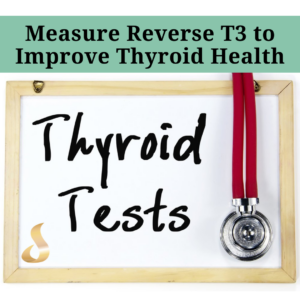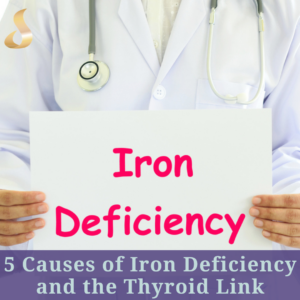What's On This Page?
ToggleIf you’ve ever been told your thyroid labs look “normal” — yet you still feel exhausted, puffy, forgetful, cold, constipated, anxious, or like your get-up-and-go got up and went — you’re not imagining things. You’re not “just stressed,” and it’s not “all in your head.” There is a very real physiological reason why millions of people remain symptomatic despite taking their daily thyroid pill.
Let’s break it down the easy way — the way I share every week in my free Thyroid Thursday email newsletters.
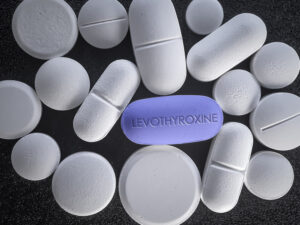
Levothyroxine Only Gives You T4… But Your Cells Run on T3
Levothyroxine (brand or generic) contains the inactive thyroid hormone T4.
It’s a storage hormone — think of it like a box in your garage. The box contains important “stuff,” but unless you take it out, open it, and put it to use, it doesn’t actually help you.
Your body must convert T4 into T3, which is the active hormone.
T3 is the one that:
-
Lands in the receptor sites of almost every cell in your body
-
Ignites metabolism
-
Supports mood, memory, digestion, heart rhythm, and energy
-
Governs hair growth, body temperature, and even reproductive health
Every organ — from your brain to your liver to your skin — is begging for T3.
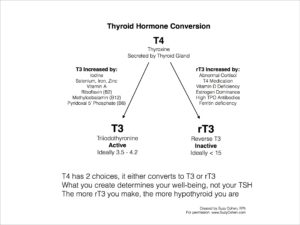
But Here’s the Problem: Many of Us Don’t Convert T4 → T3 Well: Here are 7 Reasons
This is huge – bookmark this page because there are 7 missing pieces that affect so many people. The conversion process of T4 (for example levothyroxine which is T4) can be blocked by:
-
Stress (which raises cortisol)
-
Nutrient deficiencies (selenium, ZINC, iron, B12 and others)
-
Chronic inflammation
-
Estrogen dominance – Bioidentical vs. Synthetic Hormones: How to Choose the Best Option for You
-
Certain medications
-
Elevated rT3
-
Genetic variations (like the DIO2 gene)
When that conversion slows down, you’re left with a bloodstream full of T4 that your body can’t properly use. This is why you can be taking levothyroxine faithfully — hitting “target” TSH numbers — and still feel miserable.
You may be interested in a supplement I made called Thyroid Script, because this is the exact combo needed to activate T4 and turn it into T3. You can also read this article I wrote: Top 11 Thyroid Supplements for Hypothyroidism – A Buyer’s Guide.
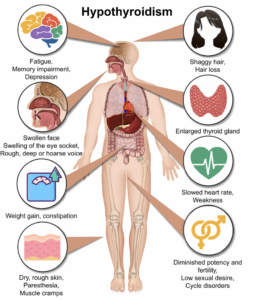
Why Many Doctors Won’t Prescribe T3 or NDT
Levothyroxine has been the gold standard in mainstream medicine for decades. It’s what most doctors were trained to use. So even if you ask about T3 (liothyronine) or natural desiccated thyroid (NDT), you may run into a wall.
And even when you do find a doctor willing to prescribe these options, it’s common to encounter another problem:
A lot of practitioners don’t know how to dose T3 or NDT correctly.
They may underdose you, leaving you symptomatic and feeling poorly even though you take medicine. They may over correct your TSH, or fail to check your reverse T3, Free T3 levels or cortisol. They may also miss important drug-nutrient or drug-drug interactions. Getting this right truly is an art and a science — and unfortunately, many clinicians simply don’t have that training. They may prescribe levothyroxine to you for years when you’re body is not able to convert and activvate it so you never feel well despite being on thyroid medications for years and years! That sucks and yet I hear it all the time.
So Where Does That Leave the Thyroid Patient?
So where does that leave you? Empowered I hope, because knowledge is your greatest asset. If this article resonates with you, here are steps many of my readers take:
1. Learn everything you can about your thyroid.
My free Thyroid Thursday newsletters are designed for exactly this — weekly, bite-sized guidance you can immediately apply.
2. Understand your own pattern.
Are you a poor converter? Do you struggle with Reverse T3? Are nutrients low? When you understand the why, your treatment path becomes clearer. Do you take a medication and still feel bad? Is it a T4 drug or a T3? Is it a combination drug?
3. Have an informed conversation with your clinician.
Once you understand what your body needs, you can advocate for yourself with confidence. You can ask for labs, or self-order them (HERE’s HOW), and you can ask for a dosage adjustment once you understand the role TSH, free T3 and T4 play and more.
4. Seek practitioners trained in both T4 + T3 therapies.
Availability varies, but they do exist — functional MDs, integrative practitioners, and certain endocrinologists who stay current on modern thyroid care. You can learn more in my book too. Thyroid Healthy.
How Stress Blocks T4 → T3 Conversion
When you’re going through long-standing emotional stress — grief, caregiving, financial strain, relationship issues, chronic anxiety, even years of “holding everything together” — your adrenal glands pump out more cortisol.
And cortisol is one of the biggest thyroid disruptors we know.
High or prolonged cortisol due to long-term stress can do a lot of damage – here are four things it can do:
1. Slow down your enzyme (deiodinase) that converts T4 into T3
This means less active hormone reaches your cells, tissues, and brain. This is essentially going to cause hypothyroidism.
2. Increase Reverse T3 (rT3)
Instead of converting T4 into usable T3, your body may convert it into Reverse T3, a blocker hormone that jams up the receptors and actually prevents T3 from working. Read this article next, Measure Reverse T3 and Get Thyroid Healthy!
3. Reduce thyroid receptors’ sensitivity to T3
Even if you do have some T3, stressed cells don’t “hear” it as well. There is more about thyroid resistance in my other article, 4 Ways to Differentiate Between Hashimoto’s and Hypothyroidism.
If you have true thyroid hormone resistance (meaning your cells aren’t responding properly to thyroid hormone produced or taken) then taking plain levothyroxine (synthetic T4) usually doesn’t move the needle much. In this condition, the body can have plenty of T4 floating around, but the tissues can’t “hear” the signal, so symptoms linger no matter how high the dose goes. Sometimes people use the term “thyroid resistance” loosely, when the real issue is poor conversion of T4 to T3, high reverse T3, nutrient deficiencies, inflammation, or stress hormones blocking the pathway.
In those cases, T4 might help a little, but most people do better when you fix the underlying issue or add a bit of T3 support in the form of Compounded T3 or Cytomel (liothyronine). True resistance, however, is its own animal so to speak, and simply piling on more T4 medicine rarely fixes this problem. I wish more people were aware of that because they’d get better sooner. Share my article to help someone else ‘get it.’
4. Disrupt adrenal–thyroid balance
Chronic stress wears down the HPA axis, which is tightly wired to thyroid function. To learn exactly what this superhighway is refer to the Cleveland Clinic’s ARTICLE.
What Does That Feel Like?
People often describe stress-related conversion issues as:
-
Feeling exhausted (but wired too) You might be interested in this article I wrote, The Hidden Role of Cortisol: Why You’re Still Tired After 8 Hours of Sleep
-
Brain fog (like thinking through a veil)
-
Weight loss resistance, or weight gain
-
Cold hands/feet
-
Hair shedding (a little is normal, but excessive hair shedding/loss could indicate hypothyroidism)
-
Constipation
- Dry skin (Read this next, The 6 Best Peptides for Beautiful Skin)
-
Heart palpitations
(Read my other article, How Laxatives and Stool Softeners Steal 6 Electrolytes And Trigger Heart Arrhythmias) -
Feeling “off” even with normal labs
This is incredibly common when someone is dealing with the long-arc stress of bereavement, divorce, financial uncertainty, relationship stress, anxiety, caregiving and major life transitions. Also, chronic illness almost always leads to some degree of hypothyroidism (or a poorly functioning thyroid gland).
Your thyroid doesn’t exist in a vacuum – your life experiences and emotional burdens absolutely show up in your labs and symptoms.
The Beautiful Part: This Is Reversible
When stress begins to ease and cortisol levels stabilize, T4→T3 conversion often improves dramatically. Supporting sleep, nutrition, adrenal health, and emotional recovery can make measurable changes.
You Deserve to Feel Like Yourself Again
Thyroid care should never be a guessing game. You shouldn’t have to settle for “normal labs” when you don’t feel normal.
You deserve energy.
You deserve clarity.
You deserve a metabolism that doesn’t make you fight for every ounce of well-being.
I’ve dedicated years to helping people climb out of this maze — through my book Thyroid Healthy, my weekly Thyroid Thursday notes, and through answering thousands of emails and questions just like yours. I do talk about levothyroxine, and other synthetic T4 medications like it. Remember, those drugs have to be activated to T3 (triodothyronine) in order to really help you.
If you’re still symptomatic despite taking levothyroxine, this is your gentle nudge to explore deeper, ask questions, and make sure you’re getting the T3 your body has been craving.
Your thyroid — and your whole body — will thank you.
If you enjoyed this article, read this one next: Iodine and Thyroid Nodules: 5 Intelligent Strategies for Management

Suzy Cohen, has been a licensed pharmacist for over 30 years and believes the best approach to chronic illness is a combination of natural medicine and conventional. She founded her own dietary supplement company specializing in custom-formulas, some of which have patents. With a special focus on functional medicine, thyroid health and drug nutrient depletion, Suzy is the author of several related books including Thyroid Healthy, Drug Muggers, Diabetes Without Drugs, and a nationally syndicated column.

